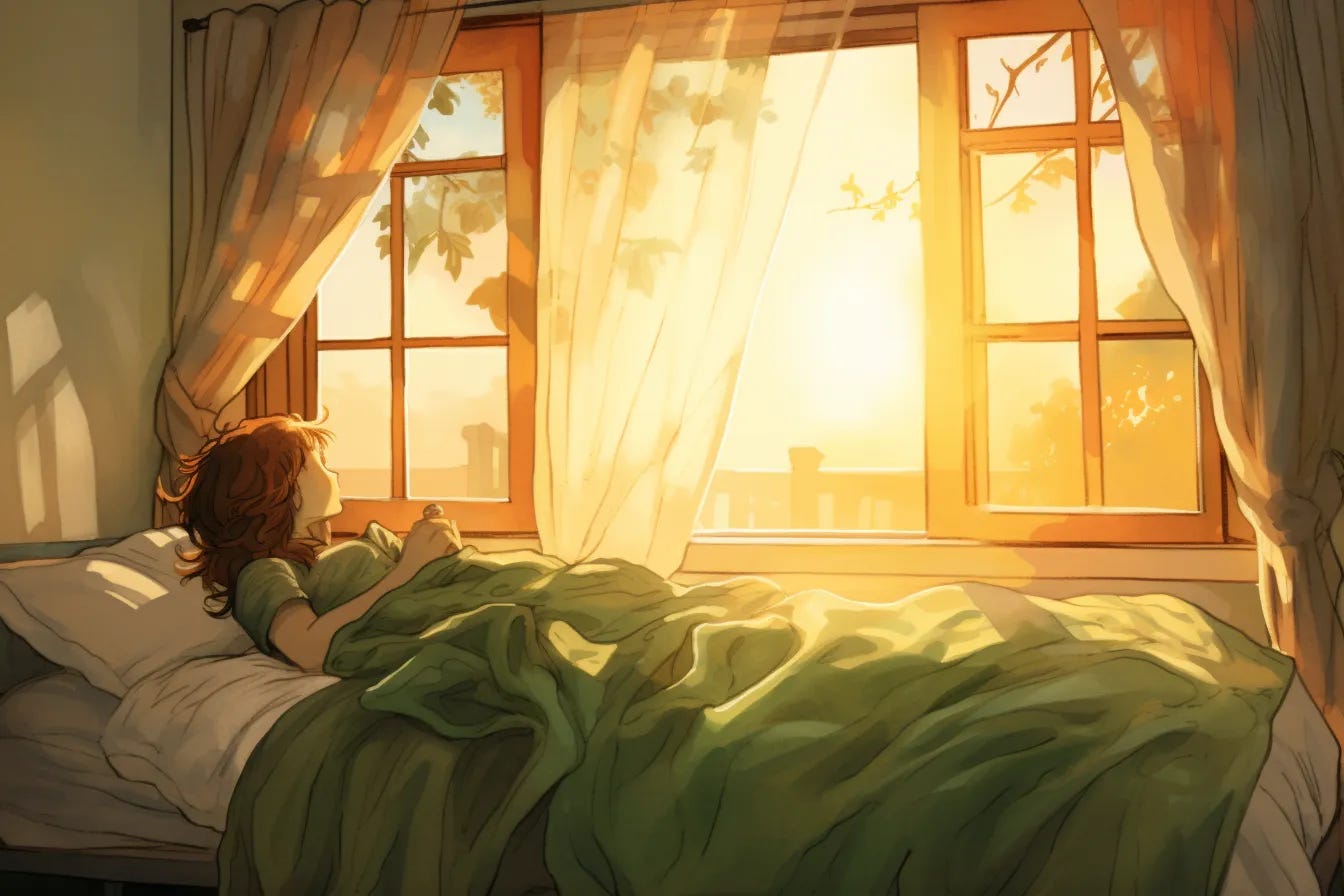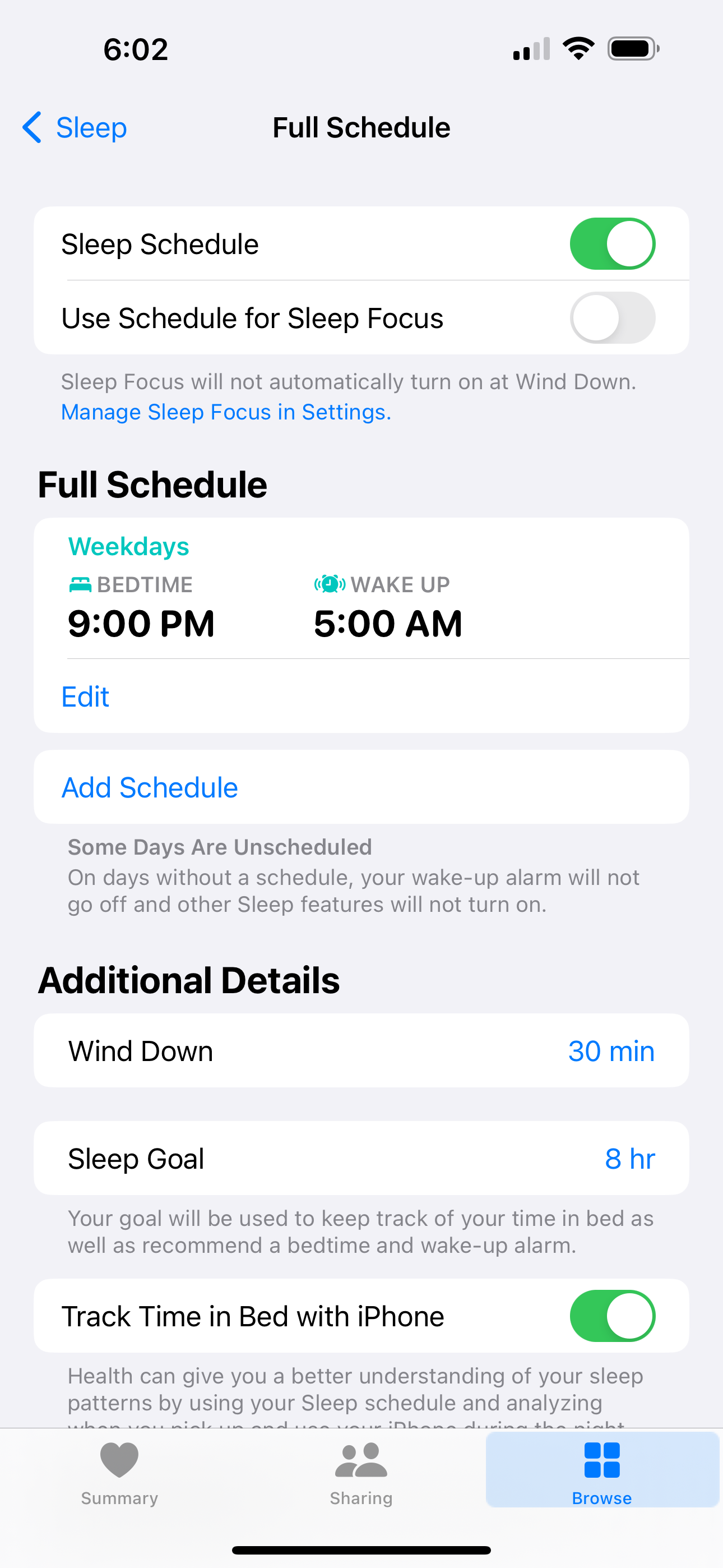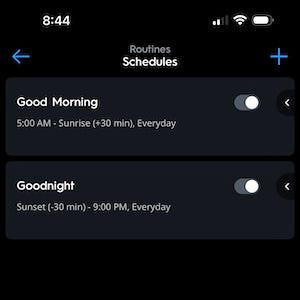How to wake up bright and early every day without feeling exhausted
You can wake up early for your morning routine without an alarm clock
“Lose an hour in the morning, and you will be all day hunting for it.”
— Richard Whately
If you’re anything like me, you’re sick of waking up and only having twenty minutes to prepare for your day. You have to wake up, eat breakfast, shower, get dressed and camera-ready for your video calls, and tidy up your office so it doesn’t look a mess on camera — and that’s just the bare minimum, never mind if you have kids or a commute. And most mornings, unless you’re lucky enough to wake up early or have nothing to do that morning, you can forget about exercising, journaling, meditating, reading, practicing, or studying.
And if you’re anything like me, you’ve tried setting an alarm and waking up earlier, and it just doesn’t work. You’re so exhausted when the alarm goes off that there’s no point dragging yourself out of bed when more sleep would be the best thing you can do for yourself right now. The only alternative to the morning rush is sleep deprivation, and that’s worse for your body over the long term than any morning rush could be.
What you’d like is a way to wake up earlier without feeling exhausted. A way to wake up earlier, without an alarm, feeling refreshed and relaxed. You could take your time getting out of bed, making your coffee, puttering around, reading a few pages, and taking a nice long shower without worrying about being in time for anything.
I have some good news for you.
You can wake up as early as you want every morning, naturally, happily, without even using an alarm clock if you don’t want. It’s actually shockingly easy once you learn how. All you have to do is trigger your body’s natural instinct to sleep.
Oh, is that all? You think, somewhat sarcastically. I’ll get right on that then.
Trust me, I hear you. You’d love to have a natural instinct to sleep earlier, but you don’t. You watch the clock tick later every night, 11 PM → 12 AM → 1 AM, and you still don’t feel tired. But there is a way to change that.
To explain, we need to start with a little science.
Why Your Circadian Rhythm Is Broken
You probably already know about your circadian rhythm, the hormone fluctuations inside your body that regulate your urge to sleep and your desire to wake up.
What you may not realize is that yours is broken.
The circadian rhythm is heavily affected by light in our environments and the time of day.1 The time of day matters, which is why you don’t fall asleep upon suddenly walking into your dark basement. Environmental light matters, too, which is why you can stay awake for 20 hours without too much effort when you fly far west and ‘gain’ time in your day.
For pre-industrial people, the only decent source of light was the sun. They could make fires and light torches after sunset, but the amount of light these provided was pitiful compared to the sun and easy to ignore by our circadian rhythm. As a result, everyone went to bed after sunset and woke shortly before sunrise. In fact, our circadian rhythms are so closely tied to light conditions that during the winter months, when nights are longer, pre-industrial people slept longer as well.
But we 21st-century humans have invented so much technology so fast that we’ve left our biology in the dust. While our circadian rhythm still thinks we fall asleep under the moonlight and wake to the dawn birds singing, we stare night and day into screens so bright and blue that the sun itself couldn’t compete. The consequence: as far as our squishy brains know, we’ve literally made the day longer and brighter. Our brains don’t trigger sleepiness until it’s too late. No wonder we constantly feel tired.
Most people wait until they feel tired to prepare for sleep. In pre-industrial societies, this made sense since the setting sun triggered sleepiness hormones. But in our electronic empire, the sun never sets. If we want to get enough sleep and wake up early and refreshed without a shrill alarm clock, we need to make the sun set.
In other words, we need to turn off all these screens.
How to Make The Sun Set On Your Electronic Empire
What you need to do is make it so the light conditions in your house mimic the light conditions of pre-industrial society: whiter and brighter during the day and orange and dimer during the evenings.
Since pre-industrial societies had no access to artificial lights, their schedules largely followed the sun. In the modern world, however, artificial lights allow us to start and stop our days whenever we please. You need to create an artificial “sunrise” and “sunset” in your house that makes sense for your schedule, and then set light conditions in your house that match these.
The first step is to pick a target wake time, the time at which you would like to get up every morning. I chose 5 AM because my day job begins at 7 AM and I generally like to have 2 hours to mill around before work, but you can pick any time you like.
The next is to calculate what your ideal bedtime should be based on that. My favorite way to do this is by using the health tracking features on my phone. On my iPhone, I did this by opening the Health app > Sleep > Full Schedule, setting my Sleep Goal to 8 hours, and setting my target wake-up time to 5 AM. This means my bedtime is 9 PM.
I recommend you give yourself 8 hours to sleep since most people need 7 ½ hours, and you will surely not instantly fall asleep the second your head hits the pillow every night, but it’s up to you.
Now you have your bedtime. You want your “sunset” to be half an hour before bedtime, giving your brain time to trigger sleepiness hormones. Now, it’s time to set up some systems to make that happen.
Turn off your electronics
By far and away, the most intrusive disruptor of light conditions in your house is your personal electronics, i.e. screens. Your phone screen, tablet screen, computer screen, and TV screen are all to blame. You need to configure those to automatically turn off a half hour before your bedtime.
Yes, off. Many devices have a feature like Night Shift, which allows you to turn the screen orange, but that isn’t enough here. Night Shift is for 2 hours before bed, allowing your brain to perceive you moving closer to sunset. At 30 minutes before bed, the sun must be completely below the horizon — your devices must be completely off.
I am notoriously impulsive and don’t have the willpower to simply put my devices down at 8:30 PM, so I use a wonderful screen time app called Jomo. In Jomo, I’ve configured block periods that shut my iPhone, iPad, & Macbook off at 8:30 PM, forcing that digital sun to set when it should. The only apps I can access after 8:30 PM are medication trackers and meditation timers.
Invest in a smart bulb
If you don’t know what they are, smart bulbs are clever lightbulbs that connect to apps on your phone. They usually can display every color of the rainbow, including blue, pink, and lime green, but we want them because they can be configured to shine certain colors at certain times that mimic the rising and setting sun.
I bought one bright smart bulb for my bedroom and configured it to:
Fade on a deep orange light at sunset (I don’t keep lights on during the day), begin dimming at 8:30 PM, and fully turn off at 9 PM. The deep orange light signals to my brain that it’s late but not time for sleep yet. The fade at 8:30 PM to nothing at 9 PM emulates the completing sunset.
Slowly turn on a whiter “dawn” color at 4:30 AM, emulating the rising sun. (Sunrise is not until 6:30 AM where I live, and I want to be up earlier than that). The light shining through my closed eyelids triggers my sleeping brain to begin waking up naturally. I wake up at 5 AM feeling refreshed, like I’m supposed to be awake — not like a train hit me, which is how I feel when I use alarms to wake up in the darkness. (The bulb automatically turns off again after sunrise).
I’m not sleepy when these automations activate. That is, after all, the point of them — if I were sleepy at 8:30 PM already, I wouldn’t need to configure these. But it takes a half hour to two hours for sleepiness to kick in after my gadgets shut down and my lights turned off. What does one do without any computers or light?
Read. I read on a Kindle, and most Kindle screens can be configured to be so dim and orange that it doesn’t interrupt sleepiness.
Journal or meditate if the urge strikes me.
Tidy up. My dishwasher takes forever, so starting it before bed is wise. Sometimes, I’ll pick up my things in preparation for the day ahead.
Write. An entire childhood spent scribbling furiously in the night is burned into my brain, and now one of my favorite things to do is write fiction in the dead of night immediately before bed. It’s something I’ve learned to accept about myself.
Sooner or later — usually sooner — I begin to feel sleepy and crawl into bed. Seven and a half hours later, I wake up early and ready for the day.
“I never knew a man come to greatness or eminence who lay abed late in the morning.”
— Jonathan Swift
In Conclusion
I’m not some god of the morning. I spent most of the year in 2019 getting up at 5 AM, but after the shutdown, I lapsed into waking up between 8 AM and 9 AM and have been for several years now. My life is a lot different than it was 4 years ago.
But this system has been working for me. In the last two weeks, I’ve renewed my efforts, successfully getting up without exhaustion at 7 AM last week and 5 AM this week. It hasn’t felt like getting hit by a train. In fact, it’s been extremely pleasant watching the sunrise, meditating, and enjoying tea before the chaos of life begins; well worth the trade-off of not staying up all night watching Doctor Who.2
This is, of course, an oversimplification. The circadian rhythm is also affected by ambient temperature, noise levels, dietary nutrition, stress levels, etc. But these are perhaps the two most major influencers, and they’re the only ones we’re concerned about in this article.
I’d say I have even more time for leisure since work isn’t following me into the evening or weighing me down in the back of my mind. I’m still watching plenty of Doctor Who 🙃 and enjoying it even more now.








Here's one more for ya, since you don't seem to have noticed:
An hour before midnight is worth two after.--- my Mom and many others.
I get all my housecleaning done between the Evening News, which I don't watch for facts but topics and nine pm, when the Beverly Hillbillies come on, by which time I have everything perfect from laundry to dishes to mopping, everything is always done, and nothing to do but whatever I want to do in whatever order seems good when I get up.
Having taken Melatonin, with the knowledge that all the daily crap is out of the way, I then watch the Beverly Hillbillies.
That is hard to do while feeling grumpy.
And reading Stacks on abusive issues makes me a bit less than real cheerful.
So Jethro and Granny Et Al make whatever stress I feel fade away and sleep as needed. If I have a physical day, I might sleep as late as seven from 9:30 PM, but if I didn't do a lot, I might wake up as early as five but more often, five thirty or even six.
Sometimes if I really had a physical day I crash earlier, without watching TV, and from that I can tell it really does make the sleep more significant if it's before midnight. You can feel it.
But I can't figure a way to make it practical to go to sleep a lot earlier because it stays light until 10 pm at the height of Summer do if you try to maintain without blackout curtains, at least for me, it's impossible.
And I rent and blackout curtains are also impossible.
But for sure, overall ya gotta beat the Sun in the morning if you want to get anything done and stay healthy doing it.
If you don't get Hillbillies, or don't want to stay up for them,cute baby videos work too.